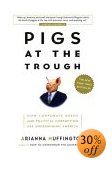Book
Reviews
 Arianna
Huffington, Pigs at the Trough: How Corporate Greed and Political
Corruption Are Undermining America
Arianna
Huffington, Pigs at the Trough: How Corporate Greed and Political
Corruption Are Undermining America
(New York: Crown Publishers, 2003). 275 pages. $22.00.
Reviewed
by Scott B. MacDonald
 Click
here to purchase "Pigs
at the Trough: How Corporate Greed and Political Corruption
Are Undermining America "
directly from Amazon.com
Click
here to purchase "Pigs
at the Trough: How Corporate Greed and Political Corruption
Are Undermining America "
directly from Amazon.com
There
is nothing better than a good double-barreled shotgun blast
of moral indignation about corruption in corporate America.
Indeed, throughout much of the 1990s, corporate America enjoyed
excesses, which certainly went to the heads of a number of CEOs.
The cases of Enron, WorldCom, Qwest, Adelphia and Tyco easily
come to mind. Were these cases reflections of the overall nature
of the U.S. business culture? Did they represent a dangerous,
insidious force seeking to undermine and ultimately control
America, much like the Dark Side of the Force in the Star Wars
saga? Should we expect the horn-headed Sith demon face of Darth
Maul among the photos of CEOs walking into the White House?
According to Arianna Huffington, herself in quite a huff in
her book, Pigs at the Trough, the answer to all of these questions
is a damning YES! The Dark Side of the Force has consumed corporate
America and the souls of the American people are up for grabs.
As she states in her chapter entitled “The Bloodless Coup:
The Corporate Takeover of Our Democracy”: “The financial
scandals of our time were made possible by an unprecedented
collusion between corporate interests and politicians that,
despite all the breast-beating about reform, is still going
strong. Together, these two powerful groups tore down hard-won
regulations that restrained the worst capitalist excesses, leaving
in their place a shaky edifice of feckless self-policing and
cowed regulators, powerless to prevent the corporate Chernobyles.”
She goes to say of Washington and lobbyists: “This is the
nexus of corporate corruption; the source of all the swill.
The unseemly link between money and political influence is the
dark side of capitalism.”
Indeed.
Huffington provides an acid-tongue criticism of corporate America
and its main political allies – of course, the Republicans
and mainly President George W. Bush and his White House team.
(No surprise that the Democrats receive a lesser tongue-lashing.)
While much of the book is entertaining – to a point and
she does score points in looking at the most blatant cases of
corruption, the ultimate product is a highly distorted view
of the business world and the people that run it. Yes, there
were horrible excesses that occurred during the 1990s, much
as they did in other business and stock market booms, both in
the United States and elsewhere. Certainly the 1870s through
the early 1900s represented a period of robber barons –
also captains of innovative American industry. American democracy
managed to mature and adapt, much as it is doing this time around.
The fundamental problem with Huffington’s book is that
what she wants is innovation and economic growth without risk.
Capitalism is hardly perfect, but it certainly beats the alternatives.
And yes, capitalism needs some degree of rules and regulations.
Some of her suggestions, such as lobbying law reforms, improving
accounting standards and strengthening corporate boards all
have merit and are being done. And there is an appeal to the
Clean Money, Clean Election model, which limits access to funding
beyond the government and the voter, eliminating hard and soft
money and the endless dialing for dollars. However, Huffington
clearly wants a heavy hand of the state to turn back the clock
on such things as the end of the Glass-Stegall Act, which hobbled
U.S. banking for decades. Her call to outlaw tax havens is hardly
realistic, considering the international politics involved.
Ultimately the cure is for the American people to take back
their political system, partially through becoming more active
in the country’s political life – including more letter-writing
campaigns. As she clamors: “Well, the time has come for
the shoppers to leave the malls and take to the streets –
to go from invigorating our economy to reinvigorating our democracy.”
With unemployment over 6% and people concerned about their jobs,
people probably are going to prefer to reinvigorate the economy.
This book should be read, but only by those who have a degree
of rectal fortitude.



